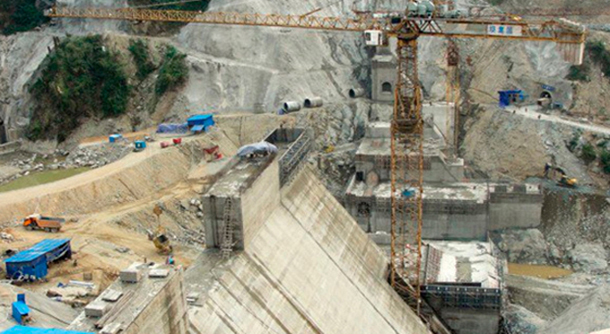RANGOON — The main investor in the controversial Myitsone hydropower dam in Kachin State has expressed a desire to restart the suspended project, according to members of a National League for Democracy (NLD) delegation that traveled to China earlier this month.
NLD Central Executive Committee member Nyi Pu said that the China Power Investment Corporation (CPI), a Chinese state-owned company that had committed most of US $3.6 billion needed to build the dam, raised the issue at a dinner meeting in Beijing.
“During the dinner, they told us how much the Chinese respect Daw Aung San Suu Kyi and how they wanted to keep the Myitsone project going,” said Nyi Pu, who led the 12-member NLD delegation that traveled to China for 10 days at the invitation of the Communist Party of China.
“We just replied to CPI that we are not the ruling party, so we don’t want to make any comment about it,” Nyi Pu told The Irrawaddy.
The Myitsone dam is a 6000-megawatt hydropower project planned for construction at the confluence of the N’mai and Mali rivers, which meet to form Burma’s largest river, the Irrawaddy. It is part of a seven-cascade dam project mainly financed and built by Chinese state-owned companies. Much of the electricity it was to generate was scheduled to be exported to China. Slated for completion in 2017, it was to be the 15th largest hydroelectric power station in the world.
In September 2011, however, Burmese President Thein Sein suspended the project until at least 2016, when his term in office expires. He cited environmental concerns and widespread public criticism. NLD leader Aung San Suu Kyi was among the many public voices calling for the dam’s suspension.
The news that CPI is still pushing to resume the project met with an outcry from activists who say that completing the dam will do enormous damage to the environment.
“The Chinese say it’s a development project. That may be true for them, but for us it would be a disaster,” said Ja Seng, president of the Kachin Women’s Union, which is based in the Kachin State capital Myitkyina, about 45 km downstream of the dam site.
She also insisted the impact of the dam would not be confined to Kachin State. “This is a national concern. Resuming the dam project could cause political instability, because the Irrawaddy River is a lifeline for all the country’s people, not just for the Kachins,” she said.
The NLD delegation’s visit to China is just the latest sign of warming ties between Burma’s largest opposition party and its powerful northern neighbor.
On April 22, the newly appointed Chinese ambassador to Burma, Yang Houlan, met Suu Kyi at her home in Rangoon, following up on a visit by his outgoing predecessor, Li Junhua, in March. The Chinese embassy has also donated 1 million kyat (around $1,000) to the NLD National Health Network several months ago.
“They are courting anyone who is likely to be in power in the future,” Ko Tar, a prominent writer and educator, said. “They will try to find any potential openings to advance their interests.”
As a strong opponent of the project, Ko Tar pointed out that the dam would be located on a seismic fault, and would result in the demise of cultural values and biodiversity in the region.
“The Chinese will keep looking for ways to get the project going again, but people in power should know that they can no longer do anything they like, as they did in the past,” he said. “Any plan to resume the dam will be bitterly opposed, for the Irrawaddy represents Burma as a whole.”

















